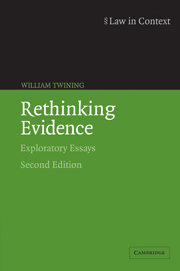Book contents
- Frontmatter
- Contents
- Preface
- Acknowledgements
- List of abbreviations
- Table of cases
- 1 Introduction: the story of a project
- 2 Taking facts seriously
- 3 The Rationalist Tradition of evidence scholarship
- 4 Some scepticism about some scepticisms
- 5 Identification and misidentification in legal processes: redefining the problem
- 6 What is the law of evidence?
- 7 Rethinking Evidence
- 8 Legal reasoning and argumentation
- 9 Stories and argument
- 10 Lawyers' stories
- 11 Narrative and generalizations in argumentation about questions of fact
- 12 Reconstructing the truth about Edith Thompson the Shakespearean and the jurist
- 13 The Ratio Decidendi of the Parable of the Prodigal Son
- 14 Taking facts seriously – again
- 15 Evidence as a multi-disciplinary subject
- Bibliography
- Index
14 - Taking facts seriously – again
Published online by Cambridge University Press: 15 December 2009
- Frontmatter
- Contents
- Preface
- Acknowledgements
- List of abbreviations
- Table of cases
- 1 Introduction: the story of a project
- 2 Taking facts seriously
- 3 The Rationalist Tradition of evidence scholarship
- 4 Some scepticism about some scepticisms
- 5 Identification and misidentification in legal processes: redefining the problem
- 6 What is the law of evidence?
- 7 Rethinking Evidence
- 8 Legal reasoning and argumentation
- 9 Stories and argument
- 10 Lawyers' stories
- 11 Narrative and generalizations in argumentation about questions of fact
- 12 Reconstructing the truth about Edith Thompson the Shakespearean and the jurist
- 13 The Ratio Decidendi of the Parable of the Prodigal Son
- 14 Taking facts seriously – again
- 15 Evidence as a multi-disciplinary subject
- Bibliography
- Index
Summary
Introduction
In 1980 I delivered a paper called ‘Taking Facts Seriously’ which is quite well known but has made almost no impact. I think that the argument is both correct and important for our ideas and practice in academic law in respect of legal method, legal theory, the law of evidence, and legal education generally. Its fate reminds me of a dictum of Karl Llewellyn: ‘When Cicero made a speech, you said: “No mortal man is so eloquent”; when Demosthenes made a speech, you yelled: “WAR!!”. ’ It seems to have been a failure of advocacy.
The occasion for the original talk was the opening of a new law school building in Victoria, British Columbia; the context was a symposium on legal education; the audience consisted mainly of judges, senior practitioners, academic lawyers, and law students. There were probably no more than four or five specialists on evidence present. My thesis was that the subject of evidence, proof and fact-finding (EPF) deserves a more salient place in the discipline of law. The gist of the argument was that fact investigation, fact management, and argumentation about disputed questions of fact in legal contexts (not just in court) are as worthy of attention and as intellectually demanding as issues of interpretation and reasoning about questions of law. It was an argument about the importance of the study of facts in legal education and it was addressed to a general legal audience.
- Type
- Chapter
- Information
- Rethinking EvidenceExploratory Essays, pp. 417 - 435Publisher: Cambridge University PressPrint publication year: 2006



